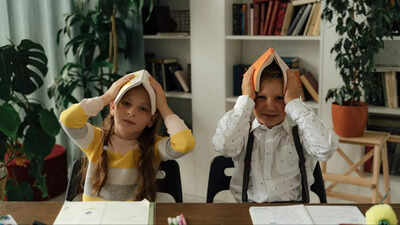ARTICLE AD BOX

6 tips that will turn your child’s education from chore to joy (Image: Pexels)
Education does not have to feel like a chore. Instead, it can be a joyful journey filled with imagination, discovery and connection. If you have ever shielded your child from every stumble, you may be holding back growth.
Letting kids face safe, age-appropriate risks builds resilience, accountability and confidence that are the real backbone of meaningful learning.The whimsical, light-hearted side of teaching nurtures ongoing creativity and engagement in children. Encouraging educators to bring joy into teaching can transform the early learning experience. Here’s how to blend fun and meaning in your child’s learning, without losing sight of real impact:
1. Let curiosity lead through play
According to a research by the LEGO Foundation and ISSA, “When kids are playing, their brains are in prime learning mode” thanks to dopamine, the brain’s pleasure chemical.
Play is not just fun; it reinforces attention, memory and problem-solving. Pretend play, especially, triggers cognitive growth. Studies show that children who deeply engage in sociodramatic play develop enhanced self-regulation, language skills, creativity and the ability to think through “what‑if” scenarios.

Unlock your child’s genius: The surprising power of playful learning revealed (Image: Pexels)
Quick wins:
- Create play kits with blocks, costumes and props.
- Encourage unstructured, child-led play and be their enthusiastic sidekick.
2. Serve up learning in real-life contexts
Tying lessons to everyday life makes them stick. Whether cooking, gardening or running a mini “store,” kids learn math, responsibility and critical thinking naturally. Playful cooking, for instance, blends measurement, sequencing and creativity while building lasting memories Living example:Whip up pancakes together (measure, mix and count) and sneak in fractions and cooking science while giggling together.
3. Infuse your home with curiosity-building tools
A novel pilot study, Interactive environments for training children's curiosity through the practice of metacognitive skills, by Rania Abdelghani, Edith Law, Chloé Desvaux, Pierre-Yves Oudeyer and Hélène Sauzéon (2024) involved teaching children metacognitive skills like asking smart questions via animated videos and interactive tasks. This pilot study explored how to train curiosity in children by teaching them metacognitive skills, which are essentially the tools for thinking about their own thinking but in a controlled, interactive environment.
The researchers designed an 8-session workshop aimed at 8- to 10-year-olds.

Stop forcing learning, try these fun tricks that actually work (Image: Pexels)
It resulted in kids asking more insightful questions and showing stronger curiosity during reading comprehension sessions. This study provides early evidence that curiosity is not just innate, it can be strengthened. Teaching children to break down their thinking process, recognise gaps, seek help and reflect on what they learn, empowers them to become more curious and confident learners.Try this:Prompt your child with questions like “What do you wonder about today?” or “If you could invent something, what would it be and why?”
4. Make learning playful, guided and empowering
Research underscores that guided play, where caregiving guidance meets child exploration, builds the best learning outcomes. It blends joy, experimentation and scaffolding to deepen understanding. Paediatric guidelines now promote integrating play into early curriculum to build executive skills like decision-making and problem-solving, which are critical for school readiness.
5. Be spontaneously playful: Kids mirror your mood
A
2017 study led by Shulamit Pinchover revealed a striking result: teacher playfulness breeds child playfulness. Elements like spontaneity and silliness in adults naturally encouraged children to loosen up, experiment and enjoy the process. Parents and educators intuitively know that their mood influences the kids' mood. When teachers lead with playful spontaneity and silliness, children respond in kind.
Sometimes, the best lessons are learned not through strict instruction but through shared laughter and imaginative play.
6. Use humour to ignite curiosity and resilience
A fascinating Penn State study found that families who embraced laughter fostered stronger bonds and emotional flexibility. Researchers at Penn State University, including Professor Benjamin Levi and pediatrics resident Lucy Emery, explored how a parent's use of humour might influence their long-term bond with their children.
They found that parents who used humour raised children who were more resilient and adaptable.
This study signals that parental humour isn’t just fun, it contributes to stronger and healthier parent-child bonds. As Levi puts it, “My hope is that people can learn to use humour as an effective parenting tool, not only to diffuse tension but develop resilience and cognitive and emotional flexibility in themselves and model it for their children.”Additional research published in Children (MDPI) supports these findings, showing that high levels of parental humour, defined by traits like cheerfulness and optimism, are linked to significantly lower risks of emotional and behavioural issues in children, especially internalising problems like anxiety and social withdrawal.



.png)
.png)
.png)
















 3 hours ago
6
3 hours ago
6









 English (US) ·
English (US) ·